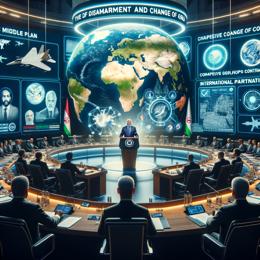Image created by AI
New Era in Syria: Sweeping Crackdowns and Diplomatic Moves Under Ahmed al-Sharaa
In a significant pivot from its troubled past, Syria under its new de facto leader, Ahmed al-Sharaa, is vigorously purging elements of the former regime while simultaneously engaging in diplomacy to secure its future. The Syrian administration is intensifying operations against those linked to ex-President Bashar al-Assad's rule, following a substantial military shakeup this month.
The Syrian state news agency, SANA, detailed an extensive "sweep operation" around Latakia, a known stronghold for the Alawite sect and former Assad loyalists. This operation targets military officials and personnel linked to Assad and his brother, Maher al-Assad, underlining the administration's resolve to sever old regime ties firmly.
However, the new leadership clarifies that the Alawite community, of which Assad is a member, is not their focus, but rather the corrupt elements that have previously perpetuated the Assad legacy. This distinction is crucial in a nation marred by sectarian divisions.
Interior Minister Mohammed Abdul Rahman has been vocal about enforcing strict measures against anyone threatening Syria's stability, reflecting heightened security measures following the recent ambush in Tartous, which resulted in the tragic loss of 14 police officers.
Beyond internal security enforcement, Syria's leadership under Ahmed al-Sharaa – previously associated with Hayat Tahrir al-Sham (HTS) and with historical ties to al-Qaeda – is reaching out diplomatically. Recent talks with Bahraini and Libyan delegations signify an earnest attempt to reintegrate Syria into the Arab and global fold. These meetings have covered pivotal issues including security collaboration and economic revival, focusing on energy, trade, and migration challenges.
Moreover, Ahmed al-Sharaa's administration received an external nod as roughly 70 Syrian military officers, suspected of fleeing to Lebanon post-Assad's downfall, were returned by Lebanese authorities and detained by Syrian forces, signaling regional cooperation.
While these developments unfold, international observers and Syrian citizens alike are watchful. The transition holds promise for stability but is fraught with challenges given Syria’s complex ethnic and religious tapestry. The international community remains tentatively hopeful but vigilant, understanding that Syria's path to recovery impacts not just its borders but potentially the broader Middle East.










